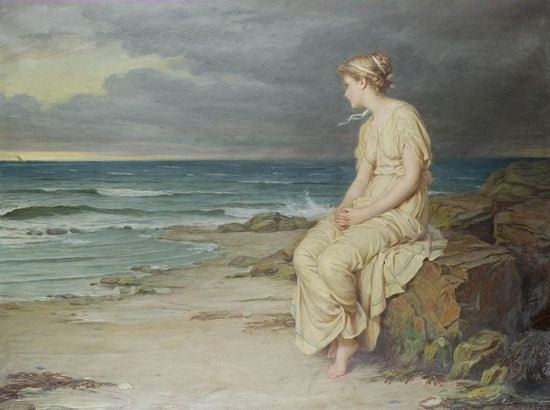Description
In the painting "Miranda" from 1875, John William Waterhouse focuses his gaze on a fascinating character, Miranda, one of the most complex figures in William Shakespeare's play "The Tempest." Known for his mastery in the use of color and the representation of female figures, Waterhouse captures in this work the fragility and beauty of Miranda, who is in a moment of contemplation and revelation.
The composition of the painting reveals an exceptional mastery of the arrangement of shapes and colours. Miranda is placed at the centre of the work, dressed in a white tunic that contrasts captivatingly with the gold and green background that evokes an energetic yet ethereal environment. Colour plays a fundamental role in this work, where pastel tones intertwine, creating an almost magical atmosphere that recalls the dreamlike world characteristic of Pre-Raphaelitism, of which Waterhouse was a prominent representative.
Miranda’s facial expressions and posture convey both vulnerability and strength, reflecting her dual character. Her pensive gaze, focused toward the horizon, suggests a connection to the supernatural and an internal reflection on her destiny. This use of the face and delicately gesturing hands contributes to the painting’s visual narrative, emphasizing the delicacy of life and even the fragility of its emotions.
Miranda’s surroundings are steeped in symbolism. The leaves and vegetation surrounding her are not merely decorative, but suggest a deep connection with nature and the protagonist’s state of mind. The use of light in the work is especially notable; a soft beam seems to illuminate Miranda from the side, creating a backlit effect that highlights the texture of her hair and the softness of her skin, while adding an atmosphere of mysticism.
Waterhouse's study of literary themes, especially those dealing with femininity and character psychology, is evident in this work. Waterhouse often depicted women in situations of revelation or transformation, and "Miranda" is no exception. By depicting anguish and hope through body language and choice of visual elements, the artist invites the viewer to participate in Miranda's narrative, turning a visual experience into an emotional connection with the character.
In conclusion, “Miranda” is a work that not only stands out for its aesthetic beauty, but also serves as a profound commentary on the human condition. Through Waterhouse’s introspective gaze, the painting invites the viewer to immerse themselves in Shakespeare’s literary universe and explore the multiple nuances of human emotions, all wrapped in the enveloping light and vibrant color that characterize the artist’s work. The union between art and literary narrative in this painting is a testament to Waterhouse’s ability to transcend the canvas and connect with the psyche of his characters, leaving an indelible mark on the heart of the observer.
KUADROS ©, a famous painting on your wall.
Hand-made oil painting reproductions, with the quality of professional artists and the distinctive seal of KUADROS ©.
Painting reproduction service with satisfaction guarantee. If you are not completely satisfied with the replica of your painting, we will refund 100% of your money.

